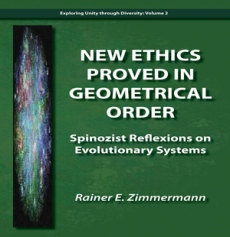NEW ETHICS PROVED IN GEOMETRICAL ORDER: SPINOZIST REFLEXIONS ON EVOLUTIONARY SYSTEMS
“The order and connection of ideas is the same as the order and connection of things.” states Spinoza in the 7th proposition of the second part of his Ethic, and we might consider this principle as a backbone of his entire work. It helps us to understand why Spinoza’s main work was an Ethic proved in geometrical order instead of having writing, for instance, a Physics proved such way… “If Spinoza had at hand the conceptual methods developed today in mathematics and physics, he would for sure take advantage of them and he could arrive to a much better end of his intention”, Rainer Zimmermann explained to me once talking about the possibilities of contemporary mathematics in relation to the understanding of complex systems. This thought also helped me to understand why Professor Zimmermann, mathematician, physicist and philosopher himself –author of the so called “transcendental materialismus”– have also devoted part of his extensive work to ethical problems recruiting conceptualizations that takes explicit account of current physics and mathematics. His philosophy does not pretend to be a “prima philosphia in the Aristotelian sense” but rather a “suitable ultima philosophia of considerable heuristic value” as –he considers- to be offered by the line of “systematic philosophy” represented by Schelling, Bloch and Sartre.
This book of Prof. Zimmermann explicitly shows the potentiality referred to in his comment concerning Spinoza’s intention and brings to the fore a contemporary mathematical machinery (based on a strict logical structure for a progressive perspective, as well as on a not so strict hermeneutic structure for a regressive perspective) in the solution to the ancient problem of the relationship between human beings and the rest of nature. Zimmermann’s book recontextualise Spinoza’s approach and proves how the theory of evolutionary systems is a prime candidate for a conceptualization that might be useful in order to concretely develop this new insight.
Concerning the interdisciplinary methodology as proposed by the author and needed for a proper investigation of information in its broad variety of mathematical, natural, social, technical and humanistic aspects, Zimmermann’s approach offers a promissory path that is worth to be considered by those trying to find proper foundations for an interdisciplinary Science of Information.
CONTENTS: 1. Introduction—Spinoza Today; 2. Spinozist Traces in the Theory of Evolutionary Systems; 3. The First Conceptual Triad (Concerning the Nature and Origin of the Mind I); 4. The Second Conceptual Triad (Concerning The Nature And Origin Of The Mind II); 5. A Game-Theoretical Viewpoint (On Human Servitude, Or The Strength Of The Emotions); 6. Artificial Life Revisited; 7. Ethics And Design (Concerning The Power Of The Intellect, Or, On Human Freedom); 8. Conclusions; Appendix I: A Very Short Introduction to Categories; Appendix II: A Not So Very Short Introduction To Evolutionary Game Theory.


